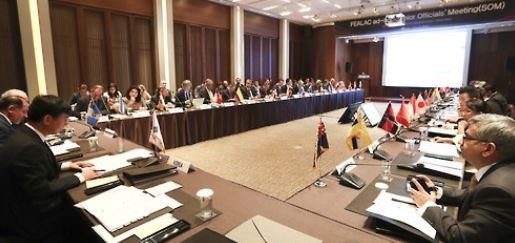The Forum for East Asia-Latin America Cooperation kicked off its three-day run in the biggest South Korean port city of Busan on Tuesday, bringing together foreign ministers from the two regions to discuss inter-regional collaboration and security issues stemming from North Korea's nuclear weapons development.
This year's FEALAC ministerial meeting marks the eighth of its kind since the idea of bridging the regions through a regular channel was proposed in 1998. Foreign ministers from 36 FEALAC member countries met in Santiago, Chile, in 2001 for the first time.
"FEALAC is a consultation body for 36 nations in the two regions, which together account for one-third of the world's population, economy and trade. It is the single inter-governmental body connecting the two continents in East Asia and Latin America," South Korean Foreign Minister Kang Kyung-wha said Monday.
 |
This file photo taken on Dec. 1, 2016, shows a high-level meeting of the Forum for East Asia-Latin America Cooperation in Seoul. (Yonhap) |
The Tuesday and Wednesday sessions of the forum will bring together working- and high-level officials for discussions at the Paradise Hotel before foreign ministers from the 36 countries hold their meeting Thursday at the Nurimaru APEC House.
FEALAC member countries encompass 16 East Asia nations, including China, Japan, Australia and members of the Association of Southeast Asian Nations, and 20 Latin American nations, including Cuba, Argentina, Brazil, Chile, Mexico, Peru and Ecuador.
Kang will co-chair the foreign ministers' meeting, together with Guatemalan Foreign Minister Carlos Raul Morales.
At this forum's conclusion, the member countries may declare the launch of a common fund to better finance the FEALAC and come up with a message of pressure over North Korea's security threat, a ministry official said.
Kang highlighted the meaning of the FEALAC gathering as the new South Korean administration's first hosting of a multilateral diplomatic event.
"This event will also be used as an opportunity to strengthen bilateral friendship with participating countries," she said. (Yonhap)








